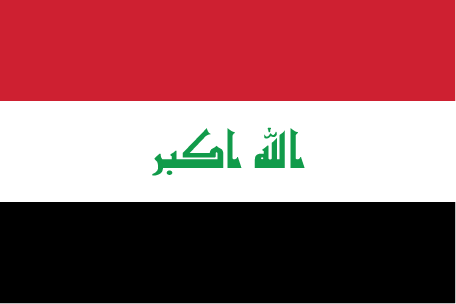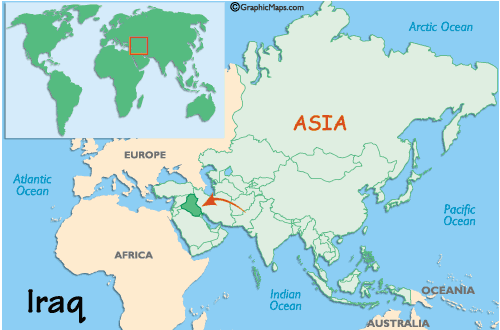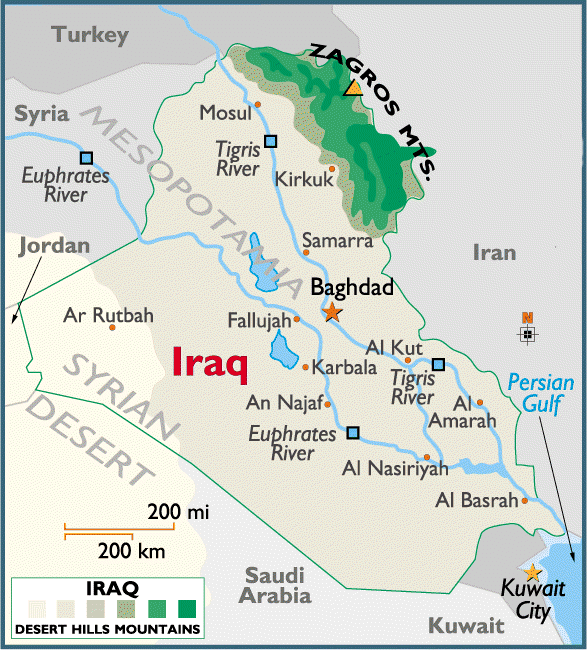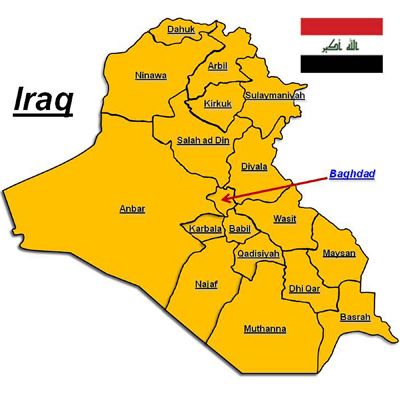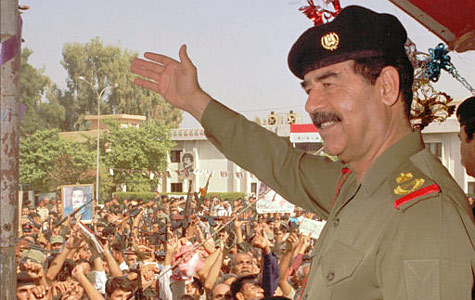
|
||||||||||||
|
|
|
Iraq
Flag Description: three equal horizontal bands of red (top), white, and black; the Takbir (Arabic expression meaning "God is great") in green Arabic script is centered in the white band; similar to the flag of Syria, which has two stars but no script, Yemen, which has a plain white band, and that of Egypt, which has a gold Eagle of Saladin centered in the white band; design is based upon the Arab Liberation colors; Council of Representatives approved this flag as a compromise temporary replacement for Ba'athist Saddam-era flag
raq, an ancient land, was once at the heart of the Mesopotamia culture, the world's first civilization. Over the centuries, numerous empires dominated Mesopotamia, the fertile land between the Euphrates and Tigris Rivers. The city of Baghdad became the most significant commercial and cultural center in the entire Muslim world. Dozens of invasions and wars would follow, and in 1638, it was conquered by the Ottoman Turks. Iraq was occupied by Britain during the course of World War I; in 1920, it was declared a League of Nations mandate under UK administration. In stages over the next dozen years, Iraq attained its independence as a kingdom in 1932. A "republic" was proclaimed in 1958, but in actuality a series of military strongmen have ruled the country since then, the latest was Saddam Hussein.
Territorial disputes with Iran led to an inconclusive and costly eight-year war (1980-88). In August 1990, Iraq seized Kuwait, but was expelled by US-led, UN coalition forces during the Gulf War of January-February 1991. Following Kuwait's liberation, the UN Security Council (UNSC) required Iraq to scrap all weapons of mass destruction and long-range missiles and to allow UN verification inspections.
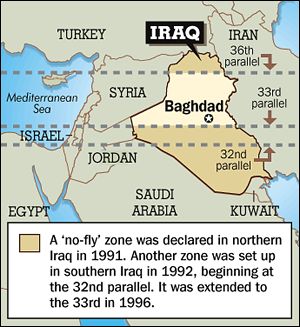
At around 0230 GMT,March 20 2003 shortly after the 48-hour deadline for Saddam to quit Iraq expires, America launches its first series of air strikes on Baghdad. George Bush says the US has begun attacks against 'targets of military opportunity'. Saddam Hussein gives a televised address to the Iraqi people at around 0530 GMT, calling the attack a 'shameful crime' and vowing to win the war. China, France and Russia denounce the US-led action. At around 1805 GMT, US planes begin a heavy bombardment of military targets in central Baghdad. Later on, British marines invade the Faw peninsula in the south of the country. The US-led invasion of Iraq in March 2003 ousted the Saddam Hussein regime. Coalition forces remain in Iraq, helping to restore degraded infrastructure and facilitating the establishment of a freely elected government. The Coalition Provisional Authority transferred sovereignty to the Interim Government on 28 June 2004.
U.S. forces captured Saddam Hussein on 13 December 2003 after finding him hiding in a small underground pit on a farm near the town of Tikrit. Late in 2005 he went on trial in Iraq for the 1982 deaths of over 140 men in the town of Dujail. On 5 November 2006 he was convicted and sentenced to death by hanging. The sentence was upheld after appeal, and Hussein was executed by hanging in Baghdad on the morning of 30 December 2006.
HISTORY At the end of World War I, Ottoman control ended and Iraq came under the authority of a British mandate. When it was declared independent in 1932, the Hashemite family, a branch of which also ruled Jordan, ruled as a constitutional monarchy. In 1945, Iraq joined the United Nations and became a founding member of the Arab League. In 1956, the Baghdad Pact allied Iraq, Turkey, Iran, Pakistan, and the United Kingdom, and established its headquarters in Baghdad. Gen. Abdul Karim Qasim took power in a July 1958 coup, during which King Faysal II and Prime Minister Nuri as-Said were killed. Qasim ended Iraq's membership in the Baghdad Pact in 1959. Qasim was assassinated in February 1963, when the Arab Socialist Renaissance Party (Ba'ath Party) took power under the leadership of Gen. Ahmad Hasan al-Bakr as prime minister and Col. Abdul Salam Arif as president. Nine months later, Arif led a coup ousting the Ba'ath government. In April 1966, Arif was killed in a plane crash and was succeeded by his brother, Gen. Abdul Rahman Mohammad Arif. On July 17, 1968, a group of Ba'athists and military elements overthrew the Arif regime. Ahmad Hasan al-Bakr reemerged as the President of Iraq and Chairman of the Revolutionary Command Council (RCC). In July 1979, Bakr resigned, and his cousin Saddam Hussein, already a key figure in the Ba’ath party and the RCC, assumed the two offices of President and RCC Chairman. The Iran-Iraq war (1980-88) devastated the economy of Iraq. Iraq declared victory in 1988 but actually achieved a weary return to the status quo antebellum. The war left Iraq with the largest military establishment in the Gulf region but with huge debts and an ongoing rebellion by Kurdish elements in the northern mountains. The government suppressed the rebellion by using chemical and biological weapons on civilian targets, including a mass chemical weapons attack on the Kurdish city of Halabja that killed several thousand civilians. Iraq invaded Kuwait in August 1990, but a U.S.-led coalition acting under United Nations (UN) resolutions expelled Iraq in February 1991. After the war, Kurds in the north and Shi'a Muslims in the south rebelled against the government of Saddam Hussein. The government responded quickly and with crushing force, killing thousands, and pursued damaging environmental and agricultural policies meant to drain the marshes of the south. As a result, the United States, United Kingdom, and France established protective no-fly zones in northern and southern Iraq. Coalition forces enforced no-fly zones in southern and northern Iraq to protect Iraqi citizens from attack by the regime and a no-drive zone in southern Iraq to prevent the regime from massing forces to threaten or again invade Kuwait. In addition, the UN Security Council required the regime to surrender its weapons of mass destruction (WMD) and submit to UN inspections. When the regime refused to fully cooperate with the UN inspections, the Security Council passed a series of Chapter VII sanctions to prevent further WMD development and compel Iraqi adherence to international obligations. Citing Iraq’s failure to comply with UN inspections, a U.S.-led coalition invaded Iraq in March-April 2003 and removed the Ba'ath regime, leading to the overthrow of the dictator Saddam Hussein. (Following his capture in December 2003 and subsequent trial, Saddam Hussein was executed on December 30, 2006 by the Government of Iraq.) The Coalition Provisional Authority (CPA) assumed security and administrative responsibility for Iraq while Iraqi political leaders and the Iraqi people established a transitional administration. The CPA’s mission was to restore conditions of security and stability and to create conditions in which the Iraqi people could freely determine their own political future. The UN Security Council acknowledged the authority of the Coalition Provisional Authority and provided a role for the UN and other parties to assist in fulfilling these objectives. The CPA disbanded on June 28, 2004, transferring sovereign authority for governing Iraq to the Iraqi Interim Government (IIG). Based on the timetable laid out in the Transitional Administrative Law (TAL), the IIG governed Iraq until elections were held on January 30, 2005; thereafter, the Iraqi Transitional Government assumed authority. In May 2005, the Iraqi Transitional Government appointed a multi-ethnic committee to draft a new Iraqi constitution. The new constitution was finalized in September 2005, and was ratified in a nationwide referendum on October 15, 2005. On December 15, 2005, Iraqis again went to the polls to participate in the first national legislative elections as established by the new constitution. The new 4-year, constitutionally based government took office in March 2006, and the new cabinet was approved and installed in May 2006. By that time, following the February 2006 bombing of the Golden Mosque in Samara, violence in the country was widespread. The ongoing violence and instability prompted President George W. Bush to increase troop numbers in Iraq (the “surge” in U.S. forces) in an attempt to improve the security situation and give Iraqi political leaders an opportunity to address the many problems that plagued the Iraqi people. Following the troop increase and adjustments to military strategy, violence declined, thereby providing political space and an improved environment for leaders to make progress on difficult national issues. In January 2009 two bilateral agreements between the United States and the Government of Iraq took effect: 1) the “Agreement between the United States of America and the Republic of Iraq On the Withdrawal of United States Forces from Iraq and the Organization of Their Activities During Their Temporary Presence in Iraq” (referred to as the “Security Agreement”) governs the presence and status of U.S. forces in Iraq, and addresses the withdrawal of these forces; and, 2) the “Strategic Framework Agreement for a Relationship of Friendship and Cooperation between the United States of America and the Republic of Iraq” (referred to as the“Strategic Framework Agreement” or “SFA”) sets out a variety of areas and aims for bilateral cooperation and forms the basis for a long-term partnership with the people and Government of Iraq. On January 31, 2009, Iraq held elections for provincial councils in all provinces except the three provinces comprising the Kurdistan Regional Government and at-Ta’mim (Kirkuk) province. On March 7, 2010, Iraq held national elections in which parties competed for positions in the Council of Representatives and the executive branch. In June 2009, in accordance with the bilateral Security Agreement, U.S. forces withdrew from urban areas in Iraq. On August 31, 2010, President Barack Obama announced the end of major combat operations, the completion of the withdrawal of all U.S. combat brigades, and the transition of the role of the remaining U.S. military force of 50,000 troops to advising and assisting Iraqi security forces. By December 31, 2011, all U.S. military forces will withdraw from the country. GOVERNMENT Iraq's legislative branch consists of an elected Council of Representatives (COR). After the 2005 elections, the Council of Representatives consisted of 275 members, each of whom was elected to a 4-year term of service. Following the March 7, 2010 elections the COR consists of 325 members to reflect an increase in the population of Iraq. At least one-quarter of the members of the Council of Representatives must be female. The responsibilities of the Council of Representatives include enacting federal laws, monitoring the executive branch, and electing the president of the republic. Iraq's judicial branch is independent, and is under no authority but that of the law. The federal judicial authority is comprised of the Higher Judicial Council, Federal Supreme Court, Court of Cassation, Public Prosecution Department, Judiciary Oversight Commission, and other federal courts. The Higher Judicial Council supervises the affairs of the federal judiciary. The Federal Supreme Court has limited jurisdiction related to intra-governmental disputes and constitutional issues. The appellate courts appeal up to the Court of Cassation, the highest court of appeal. The establishment of the federal courts, their types, and methods for judicial appointments are set forth by laws enacted by the Council of Representatives. Iraq timeline A chronology of key events: 1534 - 1918 - Region is part of the Ottoman Empire. 1914 - 1918 - World War I. 1917 - Britain seizes Baghdad. 1920 - Britain creates state of Iraq with League of Nations approval. 1920 - Great Iraqi Revolution - rebellion against British rule. 1921 - Faysal, son of Hussein Bin Ali, the Sharif of Mecca, is crowned Iraq's first king. 1932 - Iraq becomes an independent state. 1939-1945 - World War II. Britain re-occupies Iraq. 1958 - The monarchy is overthrown in a military coup led by Brig Abd-al-Karim Qasim and Col Abd-al-Salam Muhammad Arif. Iraq is declared a republic. 1963 - Prime Minister Qasim is ousted in a coup led by the Arab Socialist Baath Party (ASBP). Arif becomes president. 1963 - The Baathist government is overthrown by Arif and a group of officers. 1966 - After Arif is killed in a helicopter crash on 13 April, his elder brother, Maj-Gen Abd-al-Rahman Muhammad Arif, succeeds him as president. 1968 - A Baathist led-coup ousts Arif. Revolution Command Council (RCC) takes charge with Gen Ahmad Hasan al-Bakr as chairman and country's president. 1970 - Central government and Mullah Mustafa Barzani, leader of the Kurdistan Democratic Party (KDP), sign a peace agreement. Petroleum firm nationalised 1972 - Iraq nationalises the Iraq Petroleum Company (IPC). 1974 - Iraq grants limited autonomy to Kurdish region. 1979 - Saddam Hussein succeeds Al-Bakr as president. 1980 - The pro-Iranian Dawah Party claims responsibility for an attack on Deputy Prime Minister, Tariq Aziz, at Mustansiriyah University, Baghdad. Iran-Iraq war 1980 - 1988 - Iran-Iraq war.
IRAN-IRAQ WAR
Almost one million people died in the conflict; exchanges of war dead continued for years 1981 7 June - Israel attacks an Iraqi nuclear research centre at Tuwaythah near Baghdad. Chemical attack on Kurds 1988 16 March - Iraq is said to have used chemical weapons against the Kurdish town of Halabjah. 1990 15 March - Farzad Bazoft, an Iranian-born journalist with London's Observer newspaper, accused of spying on a military installation, is hanged in Baghdad. Iraq invades Kuwait 1990 - Iraq invades Kuwait, prompting what becomes known as the first Gulf War. A US-led coalition forces Iraq to withdraw in February 1991. Rebellion 1991 Mid-March/early April - Iraqi forces suppress rebellions in the south and the north of the country. 1991 April - A plan to establish a UN safe-haven in northern Iraq to protect the Kurds is approved at a European Union meeting. On 10 April the USA orders Iraq to end all military activity in this area. 1992 August - A no-fly zone, which Iraqi planes are not allowed to enter, is set up in southern Iraq, south of latitude 32 degrees north. 1993 June - US forces launch a cruise missile attack on Iraqi intelligence headquarters in Baghdad in retaliation for the attempted assassination of US President George Bush in Kuwait in April. 1994 10 November - Iraqi National Assembly recognises Kuwait's borders and its independence. Oil-for-food 1995 14 April - UNSC Resolution 986 allows the partial resumption of Iraq's oil exports to buy food and medicine (the "oil-for-food programme"). 1995 October - Saddam Hussein wins a referendum allowing him to remain president for another seven years. 1996 August - After call for aid from KDP, Iraqi forces launch offensive into northern no-fly zone and capture Irbil. 1996 September - US extends northern limit of southern no-fly zone to latitude 33 degrees north, just south of Baghdad. 1998 October - Iraq ends cooperation with UN Special Commission to Oversee the Destruction of Iraq's Weapons of Mass Destruction (Unscom). Operation Desert Fox 1998 16-19 December - After UN staff are evacuated from Baghdad, the US and UK launch a bombing campaign, "Operation Desert Fox", to destroy Iraq's nuclear, chemical and biological weapons programmes. 1999 February - Grand Ayatollah Sayyid Muhammad Sadiq al-Sadr, spiritual leader of the Shia community, is assassinated in Najaf. 1999 December - UNSC Resolution 1284 creates the UN Monitoring, Verification and Inspection Commission (Unmovic) to replace Unscom. Iraq rejects the resolution. 2001 February - Britain, US carry out bombing raids to try to disable Iraq's air defence network. The bombings have little international support. Weapons inspectors return 2002 September - US President George W Bush tells sceptical world leaders at a UN General Assembly session to confront the "grave and gathering danger" of Iraq - or stand aside as the US acts. In the same month British Prime Minister Tony Blair publishes a ''dodgy'' dossier on Iraq's military capability. 2002 November - UN weapons inspectors return to Iraq backed by a UN resolution which threatens serious consequences if Iraq is in "material breach" of its terms. 2003 March - Chief weapons inspector Hans Blix reports that Iraq has accelerated its cooperation but says inspectors need more time to verify Iraq's compliance. Saddam ousted 2003 17 March - UK's ambassador to the UN says the diplomatic process on Iraq has ended; arms inspectors evacuate; US President George W Bush gives Saddam Hussein and his sons 48 hours to leave Iraq or face war. 2003 20 March - US-led invasion topples Saddam Hussein's government, marks start of years of violent conflict with different groups competing for power. 2003 May - UN Security Council backs US-led administration in Iraq and lifts economic sanctions. US administrator abolishes Baath Party and institutions of former regime. 2003 July - US-appointed Governing Council meets for first time. Commander of US forces says his troops face low-intensity guerrilla-style war. Saddam's sons Uday and Qusay killed in gun battle in Mosul. Insurgency intensifies 2003 August - Suicide truck bomb wrecks UN headquarters in Baghdad, killing UN envoy Sergio Vieira de Mello. Car bomb in Najaf kills 125 including Shia leader Ayatollah Mohammed Baqr al-Hakim. 2003 14 December - Saddam Hussein captured in Tikrit. 2004 March - Suicide bombers attack Shia festival-goers in Karbala and Baghdad, killing 140 people. 2004 April-May - Shia militias loyal to radical cleric Moqtada Sadr take on coalition forces. Hundreds are reported killed in fighting during the month-long US military siege of the Sunni Muslim city of Falluja. Photographic evidence emerges of abuse of Iraqi prisoners by US troops. Sovereignty and elections 2004 June - US hands sovereignty to interim government headed by Prime Minister Iyad Allawi. 2004 August - Fighting in Najaf between US forces and Shia militia of radical cleric Moqtada Sadr. 2004 November - Major US-led offensive against insurgents in Falluja. 2005 30 January - Some 8 million vote in elections for a Transitional National Assembly. The Shia United Iraqi Alliance wins a majority of assembly seats. Kurdish parties come second. 2005 28 February - At least 114 people are killed by a car bomb in Hilla, south of Baghdad, in the worst single such incident since the US-led invasion. 2005 April - Amid escalating violence, parliament selects Kurdish leader Jalal Talabani as president. Ibrahim Jaafari, a Shia, is named as prime minister. 2005 May onwards - Surge in car bombings, bomb explosions and shootings: Iraqi ministries put the civilian death toll for May at 672, up from 364 in April. 2005 June - Massoud Barzani is sworn in as regional president of Iraqi Kurdistan. 2005 August - Draft constitution is endorsed by Shia and Kurdish negotiators, but not by Sunni representatives. More than 1,000 people are killed during a stampede at a Shia ceremony in Baghdad. 2005 October - Voters approve a new constitution, which aims to create an Islamic federal democracy. 2005 December - Iraqis vote for the first, full-term government and parliament since the US-led invasion. 2006 January - Shia-led United Iraqi Alliance emerges as the winner of December's elections, but fails to gain an absolute majority. Sectarian violence 2006 February onwards - A bomb attack on an important Shia shrine in Samarra unleashes a wave of sectarian violence in which hundreds of people are killed. 2006 22 April - Newly re-elected President Talabani asks Shia compromise candidate Nouri al-Maliki to form a new government, ending months of deadlock. 2006 May and June - An average of more than 100 civilians per day are killed in violence in Iraq, the UN says. 2006 7 June - Al-Qaeda leader in Iraq, Abu Musab al-Zarqawi, is killed in an air strike. 2006 November - Iraq and Syria restore diplomatic relations after nearly a quarter century. More than 200 die in car bombings in the mostly Shia area of Sadr City in Baghdad, in the worst attack on the capital since the US-led invasion of 2003. 2006 December - Iraq Study Group report making recommendations to President Bush on future policy in Iraq describes the situation as grave and deteriorating. Saddam executed 2006 December - Saddam Hussein is executed for crimes against humanity. 2007 January - US President Bush announces a new Iraq strategy; thousands more US troops will be dispatched to shore up security in Baghdad. UN says more than 34,000 civilians were killed in violence during 2006; the figure surpasses official Iraqi estimates threefold. 2007 February - A bomb in Baghdad's Sadriya market kills more than 130 people. It is the worst single bombing since 2003. 2007 March - Insurgents detonate three trucks with toxic chlorine gas in Falluja and Ramadi, injuring hundreds. 2007 April - Bombings in Baghdad kill nearly 200 people in the worst day of violence since a US-led security drive began in the capital in February. 2007 August - The main Sunni Arab political bloc in Iraq, the Iraqi Accordance Front, withdraws from the cabinet following a dispute over power-sharing. Truck and car bombs hit two villages of Yazidi Kurds, killing at least 250 people - the deadliest attack since 2003. Kurdish and Shia leaders form an alliance to support Prime Minister Maliki's government but fail to bring in Sunni leaders. Blackwater shootings, Turkish raids 2007 September - Controversy over private security contractors after Blackwater security guards allegedly fire at civilians, killing 17. 2007 October - The number of violent civilian and military deaths continues to drop, as does the frequency of rocket attacks. 2007 December - Turkey launches an air raid on fighters from the Kurdish PKK movement inside Iraq. Britain hands over security of Basra province to Iraqi forces, effectively marking the end of nearly five years of British control of southern Iraq. 2008 January - Parliament passes legislation allowing former officials from Saddam Hussein's Baath party to return to public life. Turkish forces mount a ground offensive against Kurdish rebels in northern Iraq. 2008 March - Unprecedented two-day visit by Iranian president, Mahmoud Ahmadinejad, to Iraq. Prime Minister Maliki orders crackdown on militia in Basra, sparking pitched battles with Moqtada Sadr's Mehdi Army. Hundreds are killed. 2008 July - The main Sunni Arab bloc, the Iraqi Accordance Front, rejoins the Shia-led government almost a year after it pulled out. 2008 September - US forces hand over control of the western province of Anbar - once an insurgent and Al-Qaeda stronghold - to the Iraqi government. It is the first Sunni province to be returned to to the Shia-led government. Iraqi parliament passes provincial elections law. Issue of contested city of Kirkuk is set aside so elections can go ahead elsewhere. Security pact approved 2008 November - Parliament approves a security pact with the United States under which all US troops are due to leave the country by the end of 2011. 2009 January - Iraq takes control of security in Baghdad's fortified Green Zone and assumes more powers over foreign troops based in the country. PM Nouri al-Maliki welcomes the move as Iraq's "day of sovereignty". 2009 February - The political bloc headed by Prime Minister Nouri al-Maliki scores big wins in provincial elections. 2009 March - US President Barack Obama announces withdrawal of most US troops by end of August 2010. Up to 50,000 of 142,000 troops now there will stay on into 2011 to advise Iraqi forces and protect US interests, leaving by end of 2011. 2009 June - US troops withdraw from towns and cities in Iraq, six years after the invasion, having formally handed over security duties to new Iraqi forces. New political groupings 2009 July - New opposition forces make strong gains in elections to the regional parliament of Kurdistan, but the governing KDP and PUK alliance retains a reduced majority. Masoud Barzani (KDP) is re-elected in the presidential election.
2010 ELECTIONS
More than 60% of Iraqis braved the threat of violence to vote 2009 October - Prime Minister al-Maliki announces the formation of a new political grouping of 40 parties, called the State of Law, after a split in the broad Shia United Iraqi Alliance that won the 2005 elections. Two car bombs near the Green Zone in Baghdad kill at least 155 people, in Iraq's deadliest attack since April 2007. 2009 December - The al-Qaeda-linked Islamic State of Iraq claims responsibility for a wave of suicide bombings in Baghdad that leaves at least 127 people dead, as well as attacks in August and October that killed 240 people. Tension flares with Tehran as Iranian troops briefly occupy an oilfield in Iraqi territory. 2010 January - Controversy as candidates with alleged links to Baath Party are banned from March parliamentary polls. A court later lifts the ban, prompting a delay in campaigning. "Chemical" Ali Hassan al-Majid, a key figure in Saddam Hussein's government, is executed. Inconclusive elections 2010 March - Parliamentary elections. No coalition wins enough votes for a majority in parliament. 2010 April - Amnesty International says political uncertainty has led to an upsurge in violence. 2010 August - Iraq's top army officer criticises planned US troop withdrawal as premature. He warns that Iraqi military might not be ready to take control for another decade. Five months after the elections, Iraq's two main political blocs suspend talks on forming a government. Seven years after the US-led invasion, the last US combat brigade leaves Iraq.
MOQTADA SADR
2010 September - Syria and Iraq restore diplomatic ties a year after breaking them off. 2010 October - Whistleblowing website Wikileaks publishes thousands of classified US military logs on the war in Iraq. Church in Baghdad seized by militants. 52 people killed in what is described as worst single disaster to hit Iraq's Christians in modern times. 2010 November - Parliament reconvenes after long delay, re-appoints Jalal Talabani as president and Nouri al-Maliki as prime minister. 2010 December - Parliament approves a new government including all major factions, ending nine months of deadlock after inconclusive elections. Some key ministries remain unfilled because nominees could not be agreed. 2011 January - Radical Shia cleric Moqtada Sadr returns to Iraq after nearly four years of self-imposed exile in Iran. 2011 February - Oil exports from Iraqi Kurdistan resume, amid a lengthy dispute between the region and the central government over contracts with foreign firms. 2011 December - US completes troop pull-out. Unity government faces disarray. Arrest warrant issued for vice-president Tariq al-Hashemi, a leading Sunni politician. Sunni bloc boycotts parliament and cabinet.
2012 March - Tight security for Arab League summit in Baghdad. It is the first major summit to be held in Iraq since the fall of Saddam Hussein. A wave of pre-summit attacks kills scores of people
2013 September - Series of bombings hits Kurdistan capital Irbil in the first such attack since 2007. The Islamic State of Iraq group says it was responding to alleged Iraqi Kurdish support for Kurds fighting jihadists in Syria.
2013 October - Government says October is deadliest month since April 2008, with 900 killed. By the year-end the UN estimates the 2013 death toll of civilians as 7,157 - a dramatic increase in the previous year's figure of 3,238.
2014 January - Islamist fighters infiltrate Falluja and Ramadi after months of mounting violence in mainly-Sunni Anbar province. Government forces recapture Ramadi but face entrenched rebels in Falluja.
2014 April - Prime Minister Al-Maliki's coalition wins a plurality at first parliamentary election since 2011 withdrawal of US troops, but falls short of a majority
2014 June-September - Sunni rebels led by Islamic State of Iraq and the Levant surge out of Anbar Province to seize Iraq's second city of Mosul and other key towns. Tens of thousands flee amid atrocities. Kurdish forces, US and Iran assist government in repelling attacks. 2015-2016 - Government and Islamic State forces fight for control of Tikrit and Anbar Province.
2016 April - Supporters of cleric Moqtada al-Sadr storm parliament building demanding new government to fight corruption and end allocation of government posts along sectarian lines.
2016 November - Parliament recognises the Shia Popular Mobilisation Units (PMU) militia as part of the armed forces with full legal status.
2017 September - Kurds back independence in referendum staged by Kurdish regional government. Baghdad imposes punitive measures.
2017 November - Government forces with Shia and Kurdish allies drive Islamic State out of all but a few redoubts. Army offensive drives back Kurdish forces in a move aimed at halting the regional government's moves towards an independent Kurdistan.
2018 May - Parliamentary elections. The political bloc of Shia cleric Moqtada al-Sadr wins most votes.
2018 October - Parliament elects veteran Kurdish politician Barham Salih as president. He appoints Adel Abdul Mahdi as prime minister, with the support of the Shia majority of MPs.
2019 September-November - At least 400 people die in protests against unemployment and corruption in cities including the capital Baghdad, prompting Adel Abdul Mahdi to tender his resignation.
Credit: CIA Fact Book, United Nations, US State Department, The BBC |
